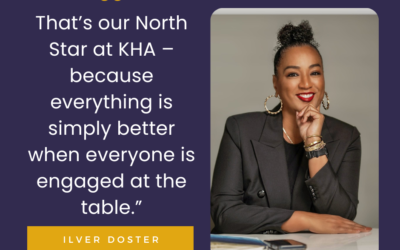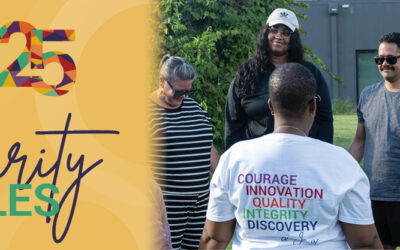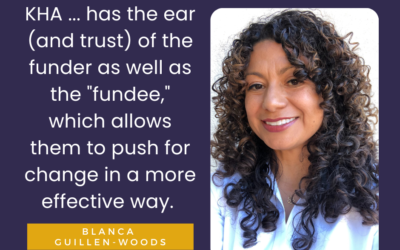Genelle Monger, CNP, is a Project Management Consultant at Keecha Harris and Associates

I first got introduced to Keecha Harris and Associates through my colleague, Jeremy Arnold. We both participated in the Child Hunger Corps program through Feeding America before he became a full time employee and Project Manager at KHA. It’s been a joy to watch his growth—from our early days fresh out of college to seeing him blossom into a skilled project manager.
Jeremy and I have stayed in touch over the years, so when KHA needed additional interview and evaluation support for the Race, Healing, and Joy project centering Black leadership in Reproductive Justice (RJ), Jeremy reached out to me to join the team as a program consultant. I can’t thank Jeremy enough – he has mentioned my name in rooms I never would have had access to otherwise! I now do this work in addition to pursuing my Masters of Public Health in Maternal and Child Health at the University of Minnesota.
Maternal and child health has been a part of my life since I was little because my mom is a breast cancer survivor. She was first diagnosed when I was about four or five, and the cancer returned when I was eight. Her illness showed me the importance of living a healthy lifestyle, having equitable access to the healthcare needed to do so, and how important mothers (and women, in general) are to the family unit.
Also, being the youngest of six siblings, I saw firsthand the impact of early intervention and the importance of making healthier choices—choices that are often difficult due to socioeconomic factors, lack of information, and cultural barriers. I strongly believe that if we take care of women and children in our society, they, in turn, will help take care of everyone else. This is not about feeding into stereotypes of women “staying at home” and being the go-to caretaker. Women just naturally tend to uplift and support others in collective ways that create a powerful ripple effect. Focusing on ensuring the health of women and children means we will create healthier communities, overall.
Centering Black Leadership and Joy in Reproductive Justice
My work on Race, Healing, and Joy projects varies each day, and I like to think of myself as a “connector” or “patch” that helps everything come together. I handle much of our relationship building and coordination with RJ leaders, including setting up site visits and maintaining our CRM of contacts and relationships. Often, I’m the first point of contact between these folx and KHA, and depending on their needs, I may route them to colleagues like Reagan Williams, Sierra Fernandez, or Jeremy Arnold.
I’m assisting with a series of interviews aimed at documenting the stories of Black leaders in the RJ movement and those closest to the issue(s). Our goal is to highlight successes while also acknowledging the challenges of being on the front lines of the movement. A broader goal is to see deeper investment in Black-led RJ, ensuring that these critical voices are at the forefront of change.
Our team spends a lot of time in meetings discussing the work. Sometimes it takes multiple meetings to make a decision, but we always prioritize community-informed, scientifically sound approaches, particularly when it comes to data collection. Because we spend so much time working together, I try to bring some fun to our Zoom meetings—whether that’s dancing to celebrate good news or finding ways to lighten the mood when discussing heavy topics. After all, if we’re going to spend so much time working, we might as well enjoy it!
Joy is what keeps us going, especially in Reproductive Justice work given the current political climate. People on the ground are constantly under attack—whether it’s verbal abuse on social media or even physical threats. To persevere in such a hostile environment, it’s crucial to remind ourselves why we got involved in this work in the first place.
As a Black woman, I’ve seen how we often smile and laugh through the pain. Even when my mom was battling breast cancer, she found ways to bring joy into the situation. I remember her in the ’90s, wearing her bright, colorful sweatsuits and walking around with her Walkman, singing even though she couldn’t carry a tune. It was her way of coping with the challenges of losing her hair, dealing with the illness, and to just keep going – for all of us.
Joy also means finding ways to not just work together, but to be in true community together. The KHA Team (and specifically, the Race, Healing and Joy project team that I work with) really does look out for each other as people, not just work colleagues. Even if it’s randomly sending a meme in Asana, or just checking in on each other throughout the day, this team genuinely cares for one another. It’s important to find and celebrate moments of joy, no matter how tough things can be. Life may not always be what we want it to be, but there are always things worth celebrating.
Genelle’s vision for a dreamy, just future
I believe we can live in a world where women are healthy and where we no longer face these stark disparities caused by stereotypes, racism, and all the other isms. I envision a world where everyone can live the life they want to live—whether that means starting a family, or choosing not to. Whether it means buying a home, or traveling full-time. I want to be part of a world where everyone feels they belong.
I’m not sure what it will take to get there, but I do know that we often focus too much on what divides us. If we can find joy and help others find it too—whether that joy comes from health, identity, gender, or something else—then that will birth the kind of world I want to see. As long as we’re not harming each other, people should be free to live as they wish. I want us to keep fighting for that vision, in the hope that one day we won’t have to fight anymore.



0 Comments